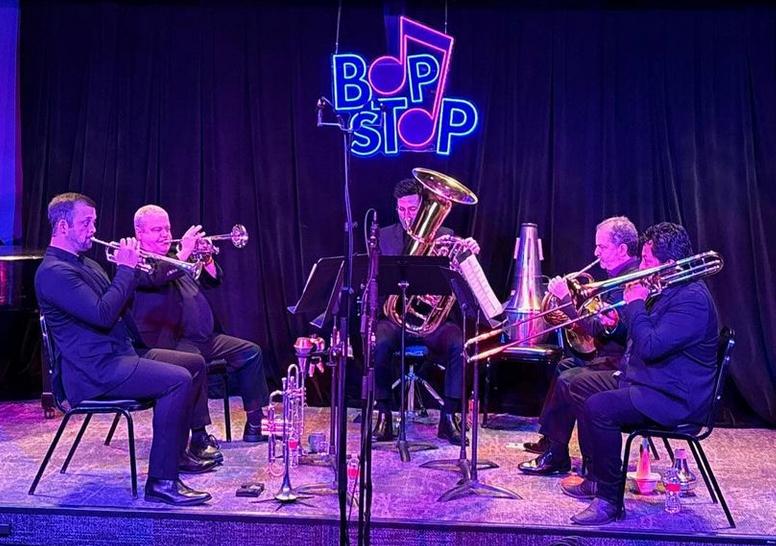by Stephanie Manning

Presented by No Exit, the brass quintet’s November 8 concert at the Bop Stop had something to satisfy fans of modern and traditional music alike. The cheery Feldpartie, appearing just after intermission, balanced out some of the evening’s more thorny works.
Originally written for an outdoor band, this arrangement by trumpet player and group founder Jon Nelson allowed the five players to anchor themselves in a satisfying blend. Nelson, fellow trumpet player Matthew Onstad, horn player Daniel Grabois, trombonist Faustino Díaz Mendez, and tuba player Tom Curry treated the charming mini symphony with love and care.
The rest of the music skipped ahead to the 21st century, treading the line between refreshingly creative and hard to parse. Lewis’ Tightrope was an equal mix of both. Grabois, the group’s spokesperson for the evening, accurately described how the music could turn on a dime between “smooth like an ice cube or crunchy like a nut mix.”
The players’ long crescendos and decresendos fit the former description, while quick dexterity from the trumpets amid waterfalls of notes characterized the latter. All seemed laser-focused on their sheet music — understandable given its difficulty and the fact it was their second-ever performance. No doubt it will become more freed up in time.
Grabois’ own Drift proved the most intriguing work of the evening, both in its concept — painting the terrain of Wisconsin via sound — and its execution. Vaguely foreboding and majestic all rolled into one, the quintet’s brushstrokes created everything from airy plains to dense rock formations. All five parts would periodically separate, drifting like the glaciers referenced in the title, before locking back in. Curry’s nimble tuba playing was on full display.
Moshe Shulman’s Subito also sported an interesting concept, written to be an experiment in sudden change. This idea falls a bit flat, however, as most of the ideas introduced don’t get much time to develop before their short sections are over. But the dry acoustic of the Bop Stop helped all the crisp staccatos come across.
After experimenting with a range of styles all evening, it was only fitting for the last big piece to be a potpourri of genres. David Sanford’s Credo, the composer’s third commission for the quintet, is the title track of Meridian’s latest album (which also includes the Haydn and Grabois pieces).
Trumpeter Jon Nelson led the group through the muted bed of trills in the second movement, and his opening fourth movement solo allowed him to relax more into the groove. In the third, the layers of competing rhythms grew in intensity until the players became a united front, as if ready to march off into battle.
The cerebral finale called for a quick palate cleanser —so a relaxed rendition of James Thornton’s “When You Were Sweet Sixteen,” anchored by the warm, singing tone of trombonist Faustino Díaz Mendez, had the last word.
Published on ClevelandClassical.com November 20, 2024.
Click here for a printable copy of this article


